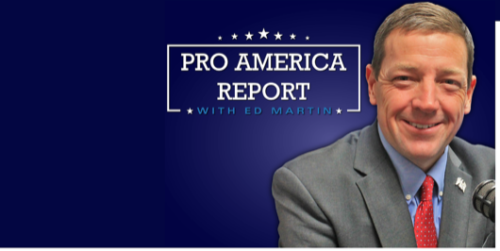Dr. John Lott has a new piece up at Newsweek on why this election will determine the future of private gun ownership in the US. Lott debated John Rosenthal, who is the co-founder of Massachusetts-based Stop Handgun Violence, and his piece is available below at the end of Lott’s. This the order that the pieces appeared at Newsweek. The debate was also reposted at MSN.

Democrats will “confiscate your guns and appoint justices who will wipe away your Second Amendment,” President Trump warned in at his acceptance speech on Thursday.
He’s right. Democrat Vice Presidential nominee Kamala Harris promised to use executive orders to ban guns, and Joe Biden has promised to make former Texas Congressman Beto O’Rourke his gun czar.
O’Rourke made a name for himself when he yelled, “Hell yes, we’re going to take your AR-15.” He called them, “Weapons of war, designed to kill people efficiently on a battlefield.”
If Democrats win control of the Senate and the presidency, the legislation they will pass and the judges that they will appoint will eventually lead to guns being banned in the United States.
Gun control advocates will dismiss this as scaremongering, but things are different this time.
Joe Biden, Kamala Harris, and Senate Democrat leaders all promise to eliminate the filibuster. That would radically transform the Senate and effect what legislation can be passed as well as let them pack the courts.
Filibusters allow senators to hold the floor for as long as they want, and thereby prevent legislation from being passed. A filibuster can only be ended with 60 or more votes. This has required at least some bipartisan support for legislation to pass. But if the filibuster is ended, simple party-line majorities will be able to pass bills. If Biden wins and Democrats gain control of both the House and Senate, legislation will be able to zip right through Congress.
The Democrats’ national platform contains a long list of gun control promises. On the agenda are national gun licensing, lawsuits against firearm manufacturers whenever guns are used improperly, bans on some semi-automatic guns that happen to look militaristic, Red Flag laws that let judges take away people’s guns without a hearing, long waiting periods for background checks, and mandatory gun storage laws. Even Democrat candidates in gun-friendly states have taken a more radical tack. U.S. Senate challenger Steve Bullock of Montana has publicly supported virtually all of the proposals in the platform.
Being able to sue gun stores and manufacturers whenever a crime or accident occurs (even a suicide) would put the firearms industry out of business.
Could you imagine what would happen to the car or the computer industries were similar rules to apply? 4.5 million Americans are injured each year in car accidents, and about 40,000 die. Criminals also frequently use cars when they commit crimes.
Similarly, computers make it easier for criminals to commit all sorts of crimes. How long would these companies remain in business if they faced lawsuits whenever their products are used improperly? Their products would become much more expensive to cover the company’s new legal fees.
While Joe Biden and Kamala Harris join Beto O’Rourke in calling AR-15s “weapons of war,” the semi-automatic AR-15 merely looks like the M-16 machine gun of Vietnam War fame. No military in the world uses these AR-15s.
Most guns owned by Americans are semi-automatics. To ban some of them based on their looks makes no sense. The AR-15 uses the same sort of bullet as small-game hunting rifles, fires with the same rapidity (one bullet per pull of the trigger), and inflicts equal damage.
Indeed, the AR-15’s .223 inch rounds are banned for deer-hunting in most US states. That’s because the small bullet is likely to prolong the animal’s suffering by wounding rather than killing it.
Democrat’s support of Red Flag laws is troubling. We all want to keep mentally ill people who are dangerous from getting guns. But with Red Flag laws, judges make decisions after only seeing a complaint about the mental state of the individual. No mental health experts are consulted, no hearing is held for up to a month after a person’s guns are confiscated, and no legal counsel is provided to those who can’t afford one.
Every state already has Involuntary Commitment laws, with all of the protections that Red Flag laws miss. A judge listens to a mental health care expert’s evaluation and has many options for treatment or protection.
At the federal level, the greatest threat to Second Amendment rights may come not from elected officials themselves, but from the judges that they pick.
Few issues divide Democrat and Republican-appointed judges more consistently and completely than gun control. President Trump’s 200 federal judicial confirmations have only just brought the courts into balance, with Democrat-appointees still controlling circuit courts for 24 states plus DC. Many of these circuit courts cover the most restrictive states and they will approve any regulation that comes before them, no matter how flagrantly it infringes on the right to keep and bear arms.
Don’t expect the Supreme Court to restrain these courts. All four Democrat appointments claim that people don’t have a right to self-defense, and have already noted that they will vote to overturn the court’s 2008 Heller and 2010 McDonald decisions. Those rulings merely ensured that the government could not completely ban guns.
Justices Stephen Breyer, Ruth Bader Ginsburg, and Sonya Sotomayor dissented from the McDonald case by claiming that the U.S. Constitution does “not include a general right to keep and bear firearms for purposes of private self-defense. . . . the use of arms for private self-defense does not warrant federal constitutional protection from state regulation.”
Four Republican-appointed justices clearly care about the right to self-defense. But they are wary of taking up gun control cases for fear that Chief Justice John Roberts will side with the liberal justices. He has already done so when it comes to religious freedom cases, DACA, and Obamacare.
Democrat Senators voted in lockstep for Supreme Court Justices Elena Kagan, Sotomayor, Breyer, and Ginsburg. They almost unanimously opposed Brett Kavanaugh and Neil Gorsuch, who support the right to self-defense.
If Democrats control the Senate, a Joe Biden presidency would mean more anti-gun judges. The Supreme Court is just one vote away from overturning precedent and ruling that both federal and state governments can completely ban guns. But these days all the decisions are being made at the Circuit court level, and the eliminating the filibuster means that Democrats could easily expand the number of judgeships, giving them majorities.
California is showing us what the future of gun ownership may look like. No one has figured out how to meet the state’s requirement for micro-stamping — a technology by which firing pins supposedly imprint a unique identifying code on each shell casing. Even if someone implements this technology, a criminal could circumvent it by simply filing down the pin or replacing it.
Handguns that don’t meet California’s impossible regulations will soon be banned.
After California imposed background checks on ammunition purchases in July 2019, 101,047 non-prohibited, law-abiding Californians were prevented from buying bullets because of mistakes in the system. The new law reduced ammunition sales by 92 percent. But the 9th Circuit Court consistently approves California’s gun control regulations, no matter how unfair or flawed they may be.
Unless Trump gets to fill another Supreme Court vacancy, restrictions such as those in California will likely be upheld, and that means handguns will eventually be banned.
Gun control activists claim they support “common sense” gun control measures, but they fight against even the most reasonable changes to their proposals. Ninety-nine percent of the time background checks stop someone from buying a gun, it is done so by mistake. It is one thing to stop a felon from buying a gun, but the system is stopping people simply because they have names similar to felons. This particularly stops minorities from buying guns, but this is easy to fix. All the government has to do is to follow the same regulations that private companies must meet when they perform background checks on employees. But Democrats strongly oppose the government being held to the same rules.
With police ordered to stand down, police budgets cut, and a third to half of inmates released from jails in many major cities across America, it’s little wonder that crime has soared. Police are extremely important in reducing crime, but even in normal times they virtually always arrive after the crime has occurred.
Having a gun is by far the most effective way for people to protect themselves. That is particularly true for the most vulnerable, people who are relatively weaker physically (women and the elderly) and those who are the most likely victims of violent crime (poor blacks who live in high-crime urban areas).
Now, as much as ever, it is important for people to fend for themselves. But gun control organizations went to court this year to close down gun stores, claiming that firearm manufacturers “exploited the current crisis to further the interests of gun manufacturers.”
Americans’ right to defend themselves and their families has never been more at stake than in this election. Democrats have become so much more radically left-wing, and have promised to change our system of government by ending the filibuster. We’re told that every election is the most important of our lifetimes, but things really are different this time.
John R. Lott, Jr., “Americans’ very right to keep and bear arms is on the ballot this election,” Newsweek, September 8, 2020.
From John Lott: If I had seen Rosenthal’s piece, I would have included a couple of additional points.
— Most academics who do research on gun control are very skeptical that these regulations are productive. If you would like to see the research on right-to-carry concealed handguns, you can see what most of the research finds here.
— The surveys on support for gun control should be viewed skeptically. When there are specific public votes on background checks they have not done very well despite huge expenditures by Michael Bloomberg.
Individual Gun Ownership Is Not at Stake in This Election
JOHN E. ROSENTHAL, CO-FOUNDER, STOP HANDGUN VIOLENCE
As a long-time gun owner, shooting sports enthusiast, businessperson and gun safety advocate, I can say with complete certainty that gun ownership is not at stake in this fall’s election.
It is well-settled law that private firearm ownership is a right guaranteed by the Second Amendment of the U.S. Constitution. However, in the 2008 Supreme Court case of D.C. v. Heller, the late Justice Antonin Scalia wrote for the 5-4 Court majority that “Like most rights, the right secured by the Second Amendment is not unlimited. [It is] not a right to keep and carry any weapon whatsoever in any manner whatsoever and for whatever purpose.” Scalia further stated that these limitations allow states to enact reasonable gun laws regarding the sale and ownership of firearms in order to reduce gun access to legally prohibited individuals, such as felons, domestic abusers, terrorists, adjudicated mentally ill individuals and children—and to do so without trampling anyone’s constitutional rights. Consequently, enacting gun safety laws, such as universal background checks, military-style assault weapon and large-capacity magazine bans, police discretion for licensing and consumer safety manufacturing regulations have been considered reasonable and legal by the U.S. Supreme Court, as well as lower state and federal courts.
And why have several states taken action to reduce gun violence?
Because over 40,000 Americans die each year, and 100,000 more are injured, due to largely preventable gun violence. Women in America are nearly 16 times more likely to die by gun violence than in other high-income countries. Guns kill more U.S. children each year than does cancer. Every thirty minutes, a child under 19 years old is shot; and every three hours, one dies from firearms. These stats do not even speak to the incredible pain felt by family and friends each time a life is lost to gun violence—or the holes in the community left by victims. We humans don’t have the gene to bury our children and ever be the same again.
Beyond the human cost of guns, each state faces an economic cost, as well. Conservative estimates suggest that gun violence costs $8.6 billion a year in medical and emergency services costs, and an additional $220 billion in lost wages, legal fees, long-term prison costs, police investigations and other related expenses. The majority of these costs (87 percent) are borne by taxpayers. By reducing gun violence, states are able to preserve more of their annual budget for constituent priorities like public safety, education and infrastructure repairs.
By framing gun violence prevention as the choice between saving lives and private gun ownership, we create a false choice and dichotomy that only results in more dead Americans and more painful, life-changing gun injuries each year. Private gun ownership and reducing gun violence can exist together, and a large majority of gun owners agree. A 2012 poll of gun owners and National Rifle Association (NRA) members found that 87 percent “agree that support for Second Amendment rights goes hand-in-hand with keeping guns out of the hands of criminals; and 74 percent of NRA members and 87 percent of non-NRA gun owners support requiring criminal background checks for anyone purchasing a gun.” Only a small fraction of gun owners and NRA members do not support laws that keep guns out of the hands of dangerous individuals.
So, while gun manufacturers and lobbyists have been successful at tricking some gun owners into believing that individual private ownership is on the line, the majority of gun owners have not been duped.
Of course, gun owners are not the only ones who want stronger gun laws.
According to a 2020 Gallup poll, over 50 percent of Americans are either somewhat or very dissatisfied with current gun laws. A 2017 Gallup poll found that 96 percent of Americans support background checks for all gun sales, 75 percent support 30-day waiting periods and 70 percent support requiring guns to be registered (like automobiles) with the police.
Some states have responded to their constituents’ desires, and the results are very positive. Look at states like Massachusetts, Connecticut, New York and New Jersey. In these states, gun deaths are less than half the national average per capita, but there is still widespread gun ownership. These states do, however, work to reduce gun violence by passing gun safety laws intended to keep guns out of the hands of the highest-risk population— dangerous individuals with a history of violence. For example, these states require gun owners to be licensed, to have passed a background check even for private sales and at gun shows, allow law enforcement discretion in issuing renewable gun licenses and ban the sale of military-style assault weapons and large-capacity ammunition magazines—the weapons of war often used in high-profile mass shootings.
I’ve hunted and, like most responsible gun owners across the U.S. and even NRA members, I do not oppose obtaining the required hunting license. That license limits the number of rounds used to shoot duck to three rounds and deer to five rounds, in order to protect the duck and deer populations. Yet if your mission is to overpower police or to kill as many people as possible in a public place without having to reload, there is no limit in most states on the number of rounds you can buy or own without a license. This makes no sense.
Study after study has shown that strong gun laws save lives without impeding gun ownership. For example, a 2019 study found that states with universal background check laws had homicide rates 15 percent lower than states without those laws. A 2020 study found that states with gun licensing laws that require in-person application or fingerprinting are associated with 56 percent fewer fatal mass shootings. On the other hand, a 2017 study of Massachusetts gun licensing laws found that 97 percent of individuals who applied for a firearm license were granted a license, indicating that even in states with strong and effective gun laws, those wishing to own firearms are still able to do so.
Urban Massachusetts, with its effective gun laws and first-in-the-nation gun industry consumer safety regulations, has the second-lowest gun death rate in the nation. Along with other states with strong gun laws, it has proven that gun laws save lives. A Boston Globe editorial suggested that 27,000 lives would be saved each year if every state had the same low firearm fatality rate as urban industrial Massachusetts. In fact, as the Centers for Disease Control and Prevention reports each year, every state with stronger gun safety laws has lower gun-related deaths than every state with lax gun laws.With widespread bipartisan support for stronger gun laws and all the data- driven results, one has to wonder why major federal gun laws have not been enacted since the federal assault weapons ban of 1994 (which expired in 2004). Background check legislation was proposed in the House of Representatives in 2019 and passed out of the lower legislative chamber— but only eight of 208 House Republicans voted in favor of the bill. The background check bill was never brought to a vote in the Senate. The answer is rooted in the fact that much of Congress has received millions of dollars in campaign donations from the gun lobby.
Which brings us back to the November election. This election is the most important election in recent history if you care about gun safety and every other social justice issue facing our country. Private gun ownership for responsible citizens will remain unchanged, but lives can be saved or lost with this vote. Americans must ask every candidate their position on gun safety when they vote this November.This year, before heading to the ballot box (or the mailbox), Americans need to know where every candidate stands on guns. More and more Americans will die from preventable gun violence until we hold our elected officials accountable on gun safety. We cannot afford to continue to line the pockets of the unregulated gun manufacturers and politicians corrupted by special- interest campaign contributions at the expense of American lives.
In November, the choice on the issue of gun violence is clear. A vote for Donald Trump and his Republican followers in Congress will result in more of the same carnage. On the other hand, a vote for Joe Biden and Democrats in Congress will not only protect gun rights for law-abiding gun owners, but will also reduce gun injuries, deaths and endless grief from preventable gun violence.
John E. Rosenthal is a gun owner, sport shooter, businessperson and co- founder of Massachusetts-based Stop Handgun Violence.






I find that in reading Mr. Rosenthal’s reply, he only referred to the States rights to regulate Sport Hunting within the individual states. The Second Amendment has nothing to do with his argument. So , I believe, he is raising a “false flag”.
“Study after study has shown that strong gun laws save lives without impeding gun ownership.”
I wonder what the person who wrote that considers “impeding?” All the “strong gun laws” are impediments. Apply the same types of controls to any other civil right and the author would be screaming about gross violation of civil rights.
A report in the CDC MMWR of October 3, 2003 said that there was zero evidence that “strong gun laws” did anything to reduce crime or violence.
A report by the National Academy of Sciences released in 2004 reached the same conclusion.
The CDC study ordered by President Obama and released in 2013 also found no evidence that “strong gun laws” reduced crime or violence.
All the anti-civil rights studies also neglect to look at defensive gun uses, although the 2013 study did briefly touch on it, admitting that there were somewhere between 300,000 and 3,000.000 defensive gun uses every year.